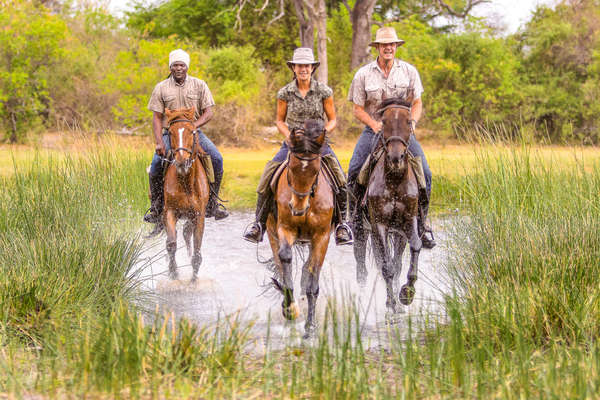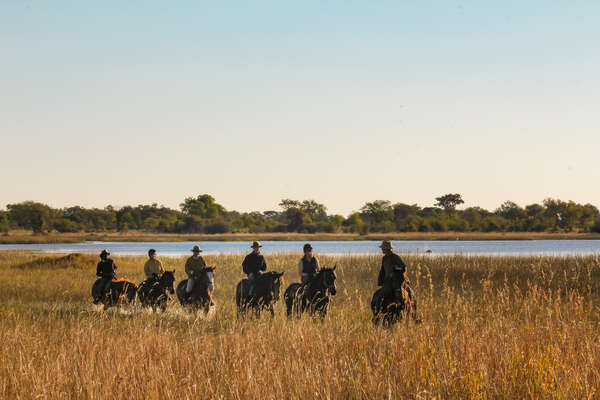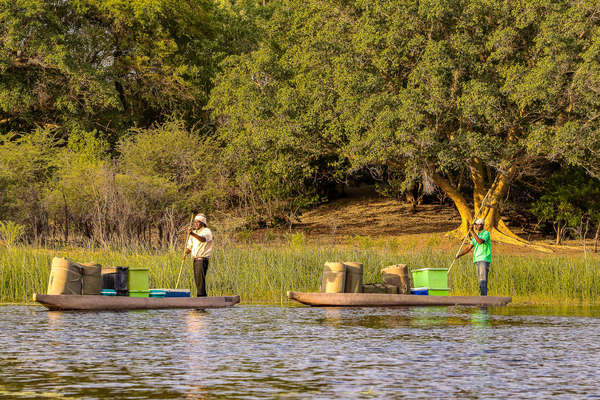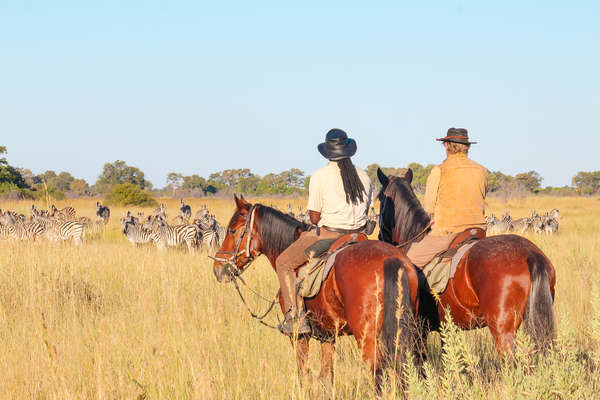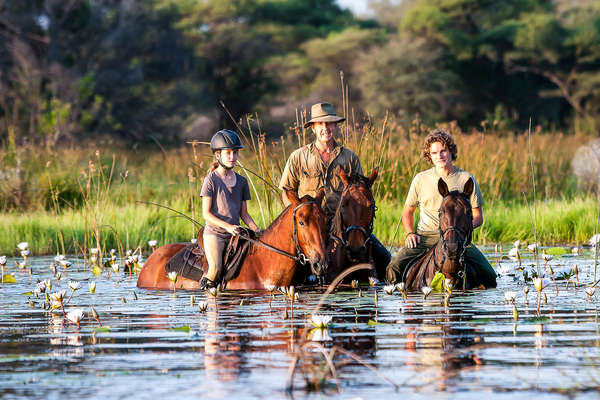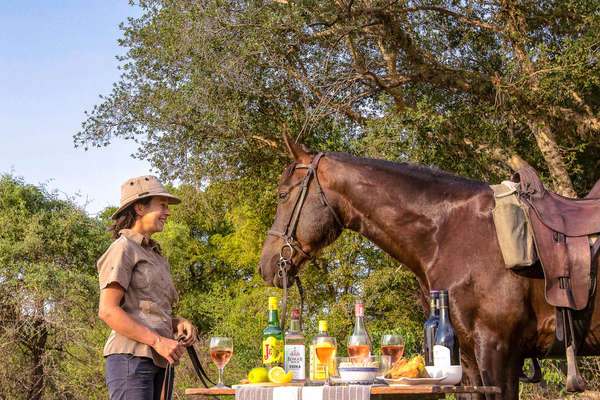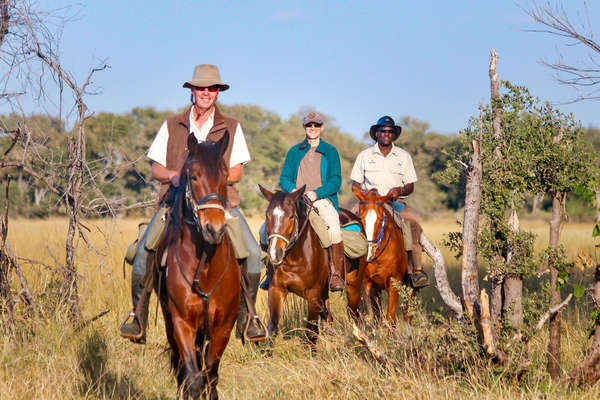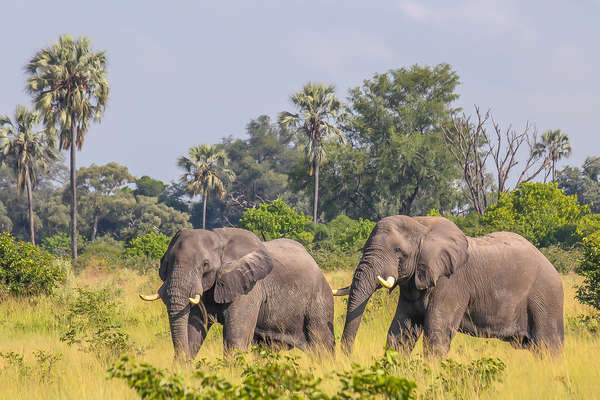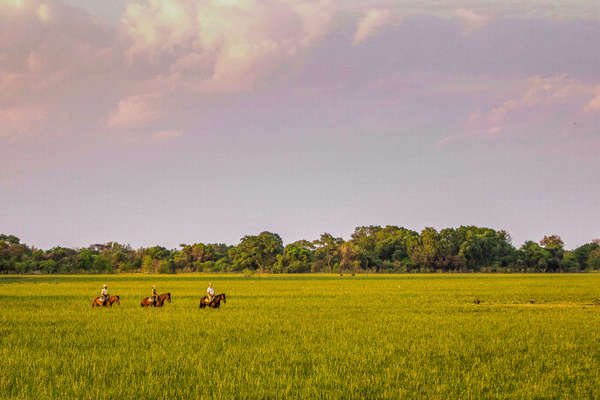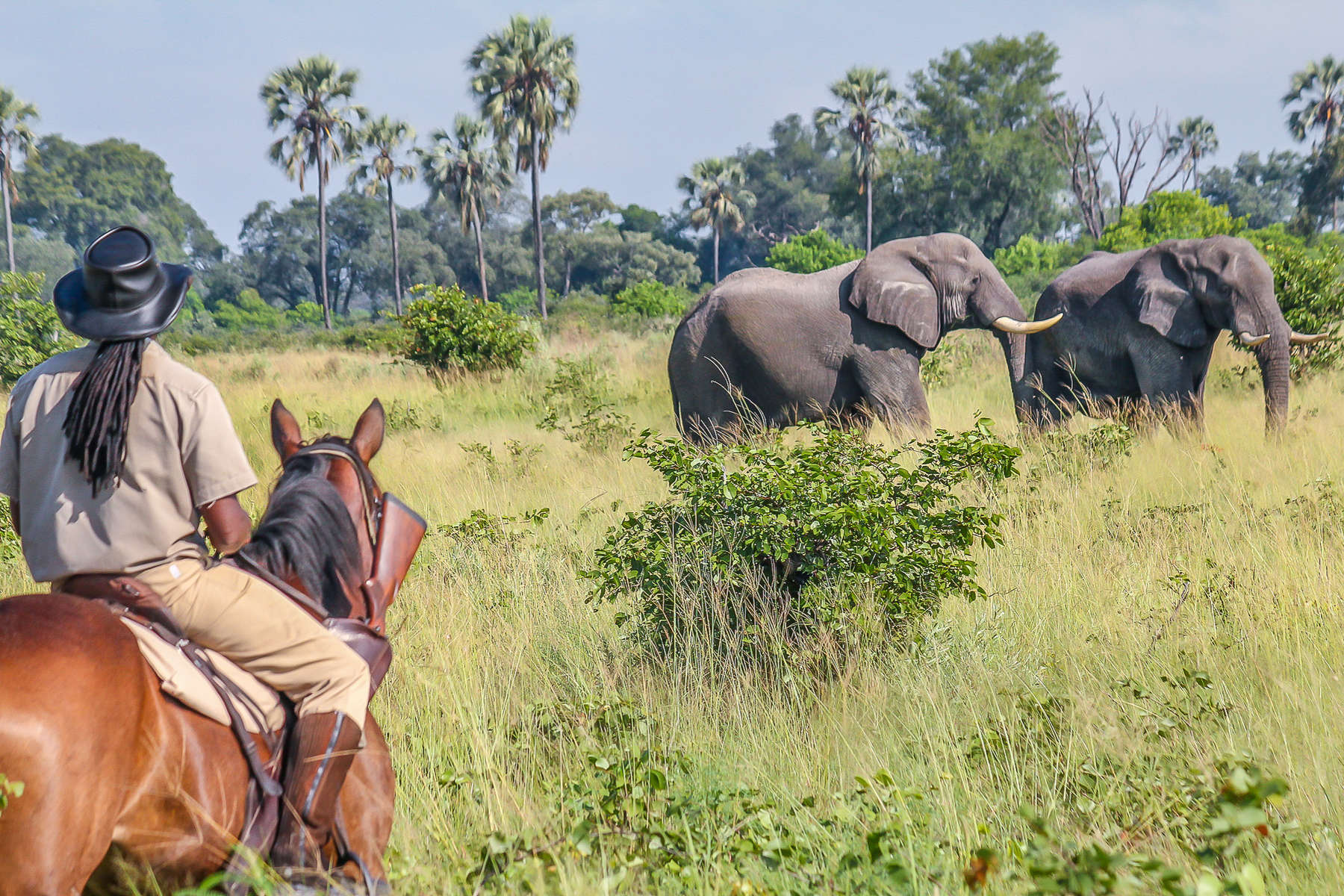
From the horse’s mouth
Itinerary
Highlights
- Ride sure and high quality horses and experience breath-taking gallops
- Interact with the local communities throughout the ride
- An eco-friendly safari with little to no environmental impact, especially during the floods when mokoros (canoes) replace jeeps to carry camp/
Dates & prices
Price details
- Rates are per person, based on two riders sharing a twin or double tent during the ride.
- Groups are composed of a minimum of 2 riders and a maximum of 8 international riders, plus guides.
- Road transfers are not included and are charged at $100.00/€95.00/£80.00 per person in 2025, and $200/€160/£130 per person in 2026.
- There is no single supplement if you are willing to share a tent with another guest of the same sex. To guarantee your own tent there is a single supplement of $910/£685/€820 in 2025, $980/£715/€830 in 2026.
- The minimum age is 12, but young riders must be experienced and willing to spend long hours in the saddle. The guide holds the right to decide whether younger riders may have to travel with an accompanying vehicle should they be unable to keep up with the group during the course of any safari. There are no discounts for children on this ride.
- Non riders can accompany the safari subject to availability and at the discretion of the guides. An itinerary will then be proposed and costed on enquiry.
- IMPORTANT : Riders over 95 kg must contact us before signing up for the ride.
- Shorter safaris are possible on request. The listed dates are for scheduled 7-night safaris - more dates can be open on request, for a minimum of 2 riders.
Please Note
The itinerary may be modified at anytime for security reasons, meteorological or events beyond our control such as blocked roads, rivers in flood, drought, strikes and local holidays. Equus Journeys, our local partners and their local guides will always strive to find the best solution and will alter the itinerary as needed.
The names of the hotels and accommodation are given for information only and depending on availability, they may be modified without notice and replaced by another of a similar standard.
Price includes
Support Team
1 backup guide
Logistics Team
Accommodation
Meals
Drinks (water, wine, beer, soft drinks)
Price doesn't include
Extras
Meals
Transport
Return airport transfers
Insurance
Optional
Accommodation
Equestrian info
Horses
Guide & local team
Minimum riding ability
Minimum riding ability
Some of the horses are very docile and will be more suitable for intermediate level riders - ask us for more information.
IMPORTANT : Riders over 95kg most contact us before signing up to this ride. Heavier experienced riders over this limit may be accepted but at our discretion and may be required to pay for a 2nd horse to alternate on for the duration of the safari.
Pace
Between 4-7 hours will be spent in the saddle each day. The longest days will be on the “move” days. This is when the camp is moved to a new location.
Tacking ability and participation
Trip conditions and Requested experience
may well be a wetland but there are hundreds of islands that host a wide variety of wildlife. The islands are generally comprised of floodplains and woodland.
Riders who don't ride regularly must absolutely get back into the saddle before heading out on this safari.
Your baggage will be transported depending on the water level by either by donkeys or by mokoro - a type of traditional canoe.
Please check with us before booking if you have any medical conditions as you will be far from medical help.
Riders must also be prepared to meet people whose cultural specificities and differences of approach must be treated with acceptance and respect.
Equestrian equipment
Water bottles holders are provided on each saddle (enough space for two saddles). Saddle bags are available.
We recommend our riders to wear a helmet to the correct standard and you should bring your own to ensure a proper fit.
Travel info
Comfort
A bathroom tent, a shower tent (bucket shower) and a mess tent are all shared (1 hot bucket shower and 1 bush loo shared between 2 tents). Breakfast and dinner will be had out around the campfire.
The mobile camp is transported by a flotilla of mekoros (traditional dugout canoes) poled by members of the local community, who live on the fringes of the Delta and know it intimately. When the water levels are too low for the mekoros to navigate, a train of pack donkeys takes over.
There are no charging facilities on this ride. We recommend guests bring with them a solar external battery bank to charge all camera equipment etc.
No wifi and little to none mobile coverage. No laundry service.
Meals
Breakfast will be had out in the bush; savoury, sweet, tea, coffee, hot chocolate, eggs and bacon.
Lunch will buffet style with options such as salad, cold meats, fruit and cheese.
Dinner will be served around the mess table and be made up of meat, vegetables, grill and fresh fruit.
Mineral water will be provided. As space is so limited on these safaris it really helps us to properly plan and pack for these trips for our guests to provide us with their specific drinks requests for both alcoholic and non-alcoholic drinks and where possible to include daily quantities. Drinking water, teas and coffees are provided.
Climate
The Okavango Delta is a seasonal flood plain and so different times of the year offer different experiences - each magical in its own way. The seasons in southern Africa are the reverse of the UK and so December/January is mid-summer with high temperatures and the chance of dramatic thunderstorms, whereas July/August is mid-winter when temperatures are lower and there is little chance of rain. The water level in the Delta depend on the rainfall in Angola and the floods usually arrive around April/May and recede around September/October, but this varies every year and is difficult to predict. The following guide may prove useful when planning the best time for your holiday.
March/April : Daytime temperatures are warm/hot (25-35c) and will drop to 10-20c at night. There is a small chance of rain and the bush is green and lush. There will be waterholes left over from the rainy season but the flood may not have arrived yet. Because of the rain, lush grazing and plentiful waterholes the game is dispersed and not gathered in big herd but will look fat and healthy.
May : Daytime temperatures are falling (20-30c) and it is starting to feel cooler at night (5-10c). The floods normally arrive in May which brings high levels of bird life. The large herds of lechwe antelope and buffalo will start to move into the area, but game is still dispersed as there is plenty to eat and drink.
June-August : Daytime temperatures are still pleasant (20-25c) but night are cold (3-5c) and so the early morning and late evenings are chilly. The floods are at their highest and so there is plenty of wading from island to island and boat activities. Hippo and crocodile may move into the area as well as large buffalo and antelope herds.
September/October : Spring arrives and temperatures start to climb with daytime temperatures of 30-45c, dropping to 15-25c at night. The floods are starting to recede, the islands are dry as there has not been rain for months and so the game starts to concentrate around the water holes.
November - February : The rain can arrive anytime in November. Daytime temperatures are high before the rains (30-40c) but drop after each shower. It is unlikely to rain persistently, but usually for a few hours. Nights are still warm (15-20c). The bush turns green after the rains and the grass starts to grow again. Once the waterholes start to fill again the game will disperse. The antelope will give birth during this time of plenty.
Tips
- Guide: US$ 10 per day per guest
- Camp Staff (including back up rider): US$ 10 per day per guest
- Community Staff (Delta only): US$ 2 per day per guest
Packing list
Our Recommendations
- Wherever possible you should wear neutral colours, such as beige, brown or natural bush colours for riding as bright colours, such as red, yellow or white can startle the wildlife and they will see you long before you've seen them
- We recommend travelling in your riding boots and carrying your hat and some riding clothes in your hand luggage - then if your luggage goes astray you are still able to ride!
- You must bring a headtorch or small torch for moving around camp at night.
- There is no electricity at Camp, a solar charging bank could be a useful item to charge camera batteries
Head
- Equus Journeys strongly recommend that you wear a riding helmet and that you take your own to ensure a correct fit.
- Sunhat for when not riding
- Sunglasses - with a cord attached so they don't fly off when riding
- Buff or bandana
Upper body
- Long sleeved shirts provide protection from the sun and thorns
- T-shirts
- Fleece, jumper or jacket - the evenings can be cold, particularly June - August
- Waterproof jacket - the rains can be difficult to foresee and it's better to be prepared. Rain is more likely Oct-April, but in the Delta you may appreciate a waterproof jacket for splashy canters May-September
- Casual clothes for the evening
Legs
- Lightweight, comfortable riding trousers or jodhpurs - we recommend riding in them at home before taking them on holiday to ensure they don't rub
- Shorts for lazy lunchtimes
- Casual clothes for the evening
Hands and Feet
- Comfortable riding boots. We recommend short boots with half chaps but you may wish to take long chaps to protect against thorns. We don't recommend taking your favourite long leather boots in case they get damaged. During the flood season you may wish to take a second pair so that you aren't putting wet boots on
- Sandals, flip-flops or trainers for moving around the lodge and camp
- Gloves - your hands are particularly exposed to the sun whilst riding
Nightwear
Other useful items
- Swimsuit
- Binoculars for viewing game
- Camera and high capacity memory card. Spare battery
- Bumbag for carrying your camera and small items whilst riding
- Waterproof pouches if you want to bring your camera or phone with you whilst riding
In your luggage
- Any liquids, such as shampoo, moisturiser, deodorant unless they are less than 100ml and all bottles can fit in a small, clear, plastic ziplock bag. Some toiletries are provided by the camp so you can pack lighter.
In your hand luggage
- Any valuables, such as your camera, ipod, ipad etc.
- Your riding hat
Medical kit
- Sunscreen and lip balm - must be high factor
- Insect repellent, preferably containing deet
- Any medication you regularly take
- Blister plasters in case of any rubs
- Antiseptic cream, plasters, aspirin, anti-histamine, insect-bite salve etc...
- Spare prescription glasses/contact lenses
- Anti malarial tablets and Yellow Fever Certificate if required (check with your doctor)
A first aid kit is available in camp but please make sure to bring any prescription medication with you.
Sustainable tourism
- Travel light. It's a little known fact, but the lighter you pack, the better for the environment as heavy bags will produce higher emissions (when flying a plane or driving a car!).
- Reduce plastic waste. Take your favorite reusable bottle with you. Avoid single-use bags, cups, or straws.
- Preserve nature. Always take your rubbish with you during the ride and recycle them. Leave all the flowers or plants as you found them, and never get too close when observing wildlife. Make sure to use eco-friendly products such as body wash or laundry detergent (if camping) to protect both your skin and the environment.
- Choose your experiences carefully. Respect animal life by not participating in any activities that abuse wild animals (shows, elephant rides, etc.).
- Support local populations. Buy local handicrafts, be respectful of customs, and learn about the culture of local communities.
- Share! Raise awareness among your family and friends about sustainable tourism.
Did you know?
Did you know?
A vast inland river delta in northern Botswana, the Okavango Delta is a huge oasis has a with one of Africa's richest eco-system - but one which is also very fragile at the same time. The Delta is home to an abundance of African wildlife and it is the 1000th UNESCO World Heritage Site in the world. The whole area is affected by annual floods which originate in Angola, arriving sometime in May to fill up waterways and lagoons before being soaked up by the floodplains and the sands of the Kalahari over the passing months. These floods are the lifeblood of this area, making these arid plains a lush animal habitat.
Our mobile horseback safari in the Okavango Delta is a safari unlike no other. No vehicles are used during the safari and a partnership with the local community guarantees this as a genuinely environmentally friendly safari.
Led by David Foot, who has a wealth of over 25 years of experience guiding throughout Africa, this safari emphasises the reality of the Delta away from the glamping permanent camps, living basically and at one with the African nature. As you ride through the Delta on horseback, from camp to camp you will have the knowledge that your carbon footprint on this amazing area, is very minimal.
All of the Big Five (elephant, rhino, buffalo, lion and leopard) are present and an abundance of plains game – but this is a vast area and you never know what you may see!

